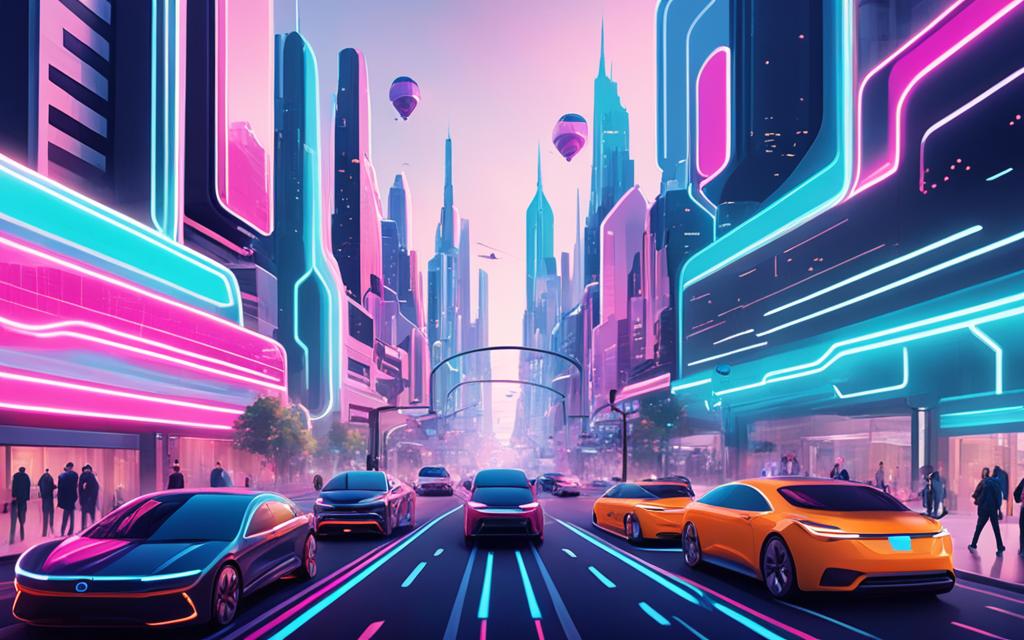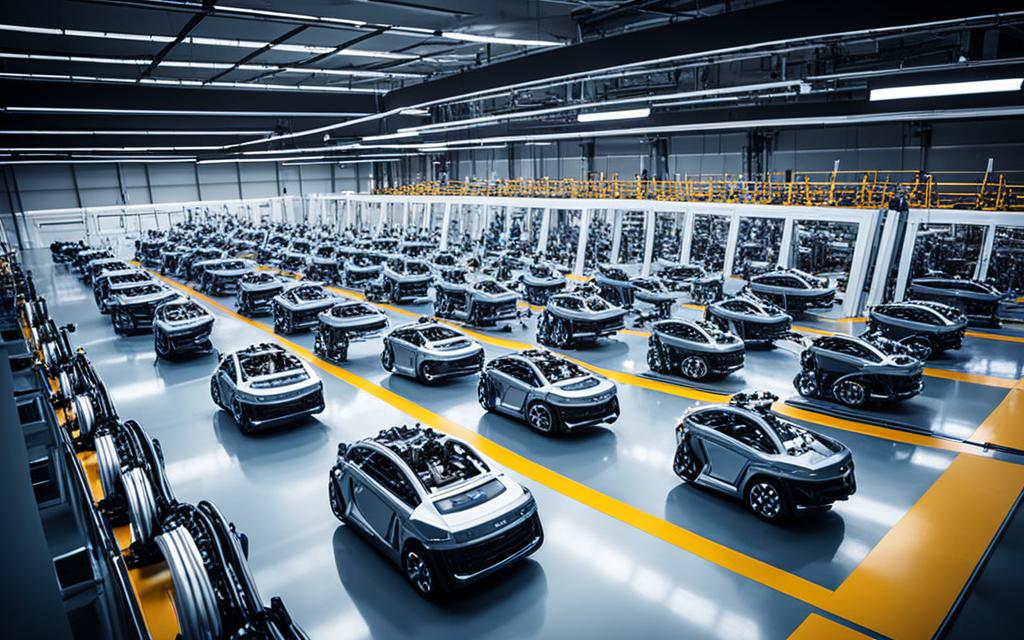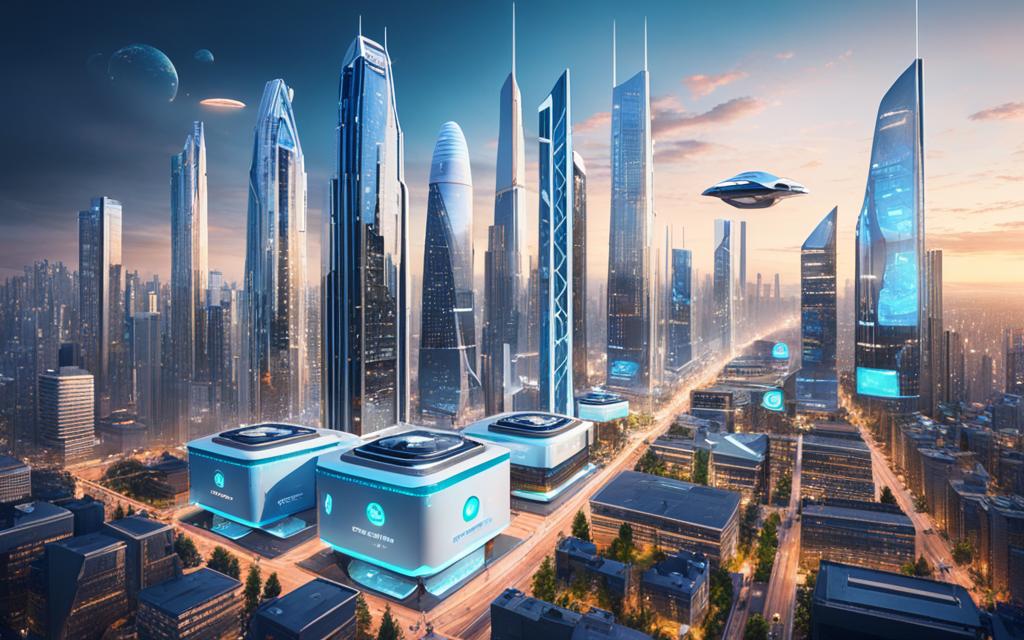Can artificial intelligence truly reshape our world as we know it?
The growth of AI technology is more than just talk. It’s becoming a big change. According to TechCrunch, AI’s fast development can really change sectors like healthcare to finance. Looking at McKinsey Global Institute’s ideas, it’s clear. The future of AI will change economies, creating new chances and efficiencies.
Forbes also shares insights on the newest AI trends. These trends are changing business and society. With things like smart machine learning and advanced data analysis, the era of AI is here. It promises a future filled with new opportunities.
Key Takeaways:
- AI’s rapid growth is set to disrupt traditional industries such as healthcare and finance.
- Future trends in AI promise to revolutionize economic landscapes and drive new efficiencies.
- Sophisticated AI applications are already transforming various sectors worldwide.
- The opportunities brought by AI include improved business processes and innovative solutions.
- Staying ahead of AI advancements is crucial for leveraging its potential effectively.
Introduction to AI and Its Transformative Potential
Artificial Intelligence (AI) is now a big part of our tech world. It brings new chances for growth and innovation. As AI gets better, it’s changing different fields. It makes operations smoother and helps create new kinds of businesses.
The Rise of AI in Modern Times
AI has hit important milestones lately. The Harvard Business Review shows how AI has grown. It’s gone from simple algorithms to complex systems that learn on their own. This growth shows how AI can change industries all over the globe.
Defining Artificial Intelligence
It’s important to understand what AI really means. According to The Alan Turing Institute, AI is when machines mimic human brainpower. They are made to think, learn, and make decisions. AI handles tasks like recognizing things, understanding speech, and making choices.
The Impact of AI on Various Industries
AI is making big changes across many fields. PwC points out its huge impact in healthcare. Here, AI helps with diagnosing diseases and creating custom treatments. In finance, it’s making fraud detection and customer service better. In transportation, AI helps with self-driving cars and improving logistics.
These AI advances show its key role in the future of many industries. It’s boosting efficiency and bringing new opportunities. By knowing what AI is and seeing its effects, we can see the huge shifts it’s bringing to our lives.
AI Advancements and Innovations
Artificial Intelligence has made huge leaps forward. These advances are changing how we use technology. This includes everything from machine learning to computer vision.

Breakthroughs in Machine Learning
Machine learning has changed AI a lot. An article in „Nature – Major Milestones in Machine Learning“ talks about this. It mentions how deep learning has sped up AI’s growth. This lets us do things like voice recognition and self-driving cars more easily.
The Role of Neural Networks
Neural networks are key to AI. An „MIT Technology Review – Understanding Neural Networks“ article explains this well. They work like the human brain and help AI learn and make decisions. This lets AI handle difficult tasks, like translating languages and making art.
Cutting-edge Developments in Computer Vision
Computer vision has made big strides in AI. „IEEE Spectrum – Advances in Computer Vision“ shows this. AI can now understand images and videos better. This tech is used in facial recognition and medical scans. It improves security and helps in healthcare and stores.
Applications of Neural Networks in Everyday Life
Neural networks are now a big part of our daily life, making many technologies better. As soon as we wake up and check our smartphones, we see their power. Devices like Apple’s Siri or Google’s Assistant use them for speech recognition. This technology understands our voice commands accurately, making interactions easy.
Think about when you’re choosing what to watch or listen to next. Netflix and Spotify give you suggestions that seem just right for you. This magic is done by neural networks. They check your past choices to give you options you’ll probably like.
But neural networks are not just for fun and phones. They are changing healthcare in amazing ways. They help create customized treatments based on your unique health and genes. This leads to better health results for everyone.
Companies use neural networks to make smart decisions. They analyze lots of data to spot trends and patterns. This helps them stay ahead in the market. Neural networks are key for pushing forward innovation and making industries more efficient.
“The potential of neural networks is virtually limitless, offering solutions from simple daily conveniences to complex medical diagnostics,” notes a study from the Neural Networks Journal.
Neural networks also power bots that can chat with customers. These bots can answer many questions quickly and accurately. This improves customer service, making it faster and more helpful.
Neural networks are making our digital experiences better. They are also changing how we look at medicine and business. Their use is growing, showing us the huge impact of this technology on our lives.
Exploring the Capabilities of Computer Vision Technology
Computer vision technology is changing our world thanks to artificial intelligence. It has many uses across different fields. This means we understand and use digital data in new ways.
How Computer Vision is Changing Healthcare
AI in healthcare is a big step forward with computer vision. AI helps doctors find diseases by looking at medical images. It makes treatments better by learning from patient data.
This cutting-edge tech cuts down on mistakes and boosts what experts can do. So, patients get better care and health results.
Impacts on Security and Surveillance
Computer vision in security has reshaped how we stay safe. AI makes watching over places with cameras much smarter than before. It spots dangers faster, keeping watch around the clock.
This means quicker actions in emergencies, making areas safer for everyone. With AI, cameras pick up on the unusual stuff, guiding the response team right away.
| Sector | Application | Impact |
|---|---|---|
| Healthcare | Diagnostics & Treatment Planning | Improved Accuracy & Personalized Therapies |
| Security | Surveillance Systems | Real-Time Threat Detection & Response |
Natural Language Processing: Transforming Communication
Natural language processing (NLP) is key in making AI communication better. It allows machines to understand and talk with human language. This is a big step in making conversations with computers more natural.
NLP is great at looking at text and how people talk. The Annual Review of Linguistics says it helps AI understand lots of words. This makes AIs more accurate and helpful in many ways.
Chatbots and virtual assistants are big uses of NLP. Chatbots Magazine says they give better customer service thanks to NLP. This makes things faster and more personal for users.
| Application | Impact on AI Communication | Example |
|---|---|---|
| Chatbots | Improves customer service by providing immediate and relevant responses | Siri, Google Assistant |
| Virtual Assistants | Enhances user experience through personalized interaction | Amazon Alexa |
NLP is growing fast and will make AI chat better in the future. We will see more human-like talking with AI. This shows NLP’s big role in changing technology.
The Future of Robotics and Automation
Robotics automation has made huge leaps, thanks to AI-driven technologies. For years, AI has helped manufacturing become more efficient. It has also set new quality standards in different sectors.
AI-driven Advancements in Manufacturing

AI is making production lines much better. Predictive maintenance helps avoid downtime, making machines last longer. Thanks to AI, factories can spot and fix machine problems early. This keeps production smooth.
The accuracy in robotics automation means products are of higher quality with less waste. This is a big win for manufacturing.
Changing the Landscape of Service Industries
AI is changing service industries in big ways. For example, retail stores use AI to create personalized shopping experiences. They analyze data to know what customers like. In hospitality, robots help with everything from check-ins to room service. This makes things more efficient and guests happier.
Robotics automation is now a key part of our world, not just a future idea. It’s improving manufacturing and making services like retail and hospitality better. AI’s role in these industries is huge and very positive.
AI Ethics and Governance: Navigating Complexities
As we use more AI technology, ethical and governance issues become big challenges. We must carefully examine these challenges to use AI responsibly. It’s crucial to think about the moral issues and legal rules that control AI in different areas.
Addressing Ethical Dilemmas in AI
One major issue in AI ethics is making AI systems work in a transparent and fair way. Harvard points out we need clear rules to stop AI biases. These rules help make AI systems fair, accountable, and easy to understand.
“We must develop governance models that can adapt to the rapid technological advancements of AI,” emphasizes experts from Harvard.
The debate on AI ethics isn’t just academic. Ethical rules now have to deal with real-world uses, like in healthcare and criminal justice. In these areas, the impact of biased AI can be really bad.
Regulations and Policies for Safe AI Use
Rules and policies are key to managing AI. The European Union, through the European Commission, has strict AI rules. These focus on keeping users safe and protecting their data. The rules make sure AI technologies meet ethical standards and keep users safe from harm.
To govern AI well, we need to work together internationally. Making AI rules the same worldwide can help us oversee AI applications better. This is especially important as AI affects economies across the world.
Finding a balance between innovation and rules is tough but needed. Good AI governance needs ongoing talks among tech experts, ethicists, regulators, and the public. Together, they can deal with the ethical challenges of using AI.
Possibilities of AI: Opportunities and Future Trends
Looking to the future, we see how crucial AI is for unlocking new chances. The talk on AI opportunities exploration highlights the education sector’s major shift. Here, AI will bring personalized learning and better educational results, says the World Economic Forum.
Future guesses by Futurism show AI changing both the economy and how we live. Its effects are wide, even making travel safer and more efficient by improving transportation.
In energy, AI aims to use resources better, aiming for sustainability and saving power. Knowing the trends in AI future helps companies stay competitive and proactive.
Many fields are already benefiting from exploring AI. From special energy methods to improved learning tools, AI’s future looks exciting and game-changing. The list below shows how AI is creating change:
| Sector | Opportunities |
|---|---|
| Education | Personalized Learning, Enhanced Outcomes |
| Energy | Resource Management, Sustainable Practices |
| Transportation | Streamlined Logistics, Safer Travel |
So, as we explore AI further, we find many chances to reshape our world. Staying aware and flexible allows us to fully use AI for innovation and growth.
AI’s Societal Impact and Artificial General Intelligence
Artificial general intelligence (AGI) marks a major step in AI’s evolution. It could do any task that humans can, bringing hopes for great advances. Still, AGI comes with big risks that need careful attention.
The Promise and Perils of AGI
AGI’s main benefit is pushing innovation in areas like healthcare and education. It might offer custom medical treatments or find sustainable solutions for the planet. Yet, the impact of AI on society brings worries, like jobs lost and ethical issues. The positive and negative sides of AGI mean we must discuss and make wise policies to use it safely.
Shaping Public Perception of AI
How people see AI greatly affects its use and role in society. The media and educational efforts are key in forming these views. Teaching what AI can and can’t do helps reduce baseless fears. We need a fair view that sees AI’s good and bad sides.
By grasping both the artificial general intelligence’s benefits and risks, and shaping how the public sees AI, we can deal with its impacts better. This way, AI developments will aim for humanity’s good, leading to a future where technology works well with society.
Conclusion
Looking back at our journey through the changing world of artificial intelligence, it’s clear its potential is huge. Reviewing insights from various studies, a story of swift growth and big change in many areas emerges. AI’s progress, especially in machine learning and healthcare, shows a path of unstoppable advancement.
Experts from „MIT Press – Looking Ahead with AI“ and „The AI Journal – AI Trend Analysis“ agree on AI’s future. It’s set to impact education, energy, and transportation next. These changes will make technology a bigger part of our lives, boosting productivity and opening new opportunities.
In wrapping up, AI’s ethical issues and the need for good governance are crucial. As AI grows, we need strong guidelines to use it wisely. I believe with the right focus, AI will improve our lives and lead us to unexplored possibilities. Artificial intelligence’s journey is just beginning, and it’s going to be an amazing ride.
